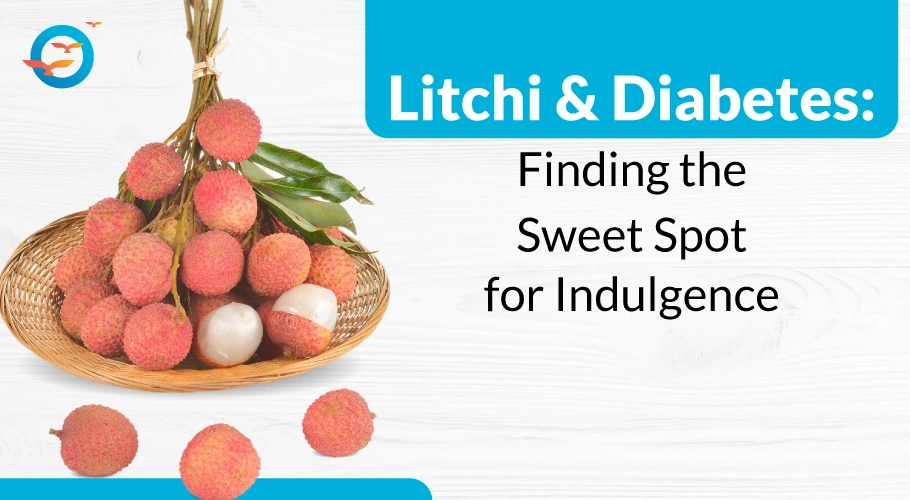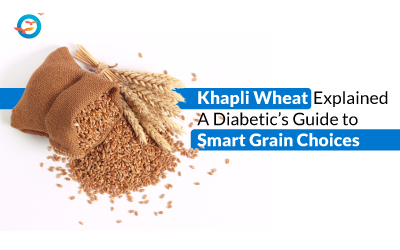Can Diabetics Have Litchi?

Litchi for Diabetes Management: How Much is Safe?
When it comes to managing diabetes, diet plays a pivotal role. Many diabetics find themselves wondering about the safety and impact of various fruits on their blood sugar levels.
One such fruit that often raises questions is litchi. With its sweet, juicy taste and refreshing nature, litchi is a favorite for many. But can diabetics indulge in this delightful fruit without jeopardizing their health?
What is Litchi?
Litchi, a very delicious and pleasant fruit. It is encased within a rough, reddish-brown shell and has a translucent, succulent flesh with a unique and enticing flavor. Its grown in states of Bihar, Uttar Pradesh and North East of India.
This fruit is a special treat at the beginning of June. The juiciness of litchis during scorching heat makes it all the more tempting to be taken during this time. No wonder it's the most desired fruit during this time.
Nutritional Profile of Litchi
Before diving into whether litchi is safe for diabetics, let's take a closer look at its nutritional content. Litchi is rich in vitamins, particularly vitamin C, which boosts immunity and promotes healthy skin.
It also contains a good amount of potassium, which is essential for heart health, and antioxidants that combat oxidative stress. However, the sugar content in litchi is relatively high compared to some other fruits. Approximately 100 grams of litchi contains about 15 grams of sugar and around 66 calories.
Glycemic Index of Litchi: What Diabetics Should Know
The Glycemic Index (GI) is a ranking of how quickly carbohydrate-containing foods raise blood sugar levels. Foods with a high GI can cause a rapid spike in blood sugar, which is something diabetics need to avoid.
Litchi has a moderate GI of around 50 meaning it can affect blood sugar level so one needs to be cautious about portion size.
Litchi Benefits for Diabetics
While the sugar content in litchi is notable, it also comes with several health benefits that can be advantageous for diabetics when consumed in moderation.
1. Rich in Antioxidants:
Litchi is packed with antioxidants like flavonoids, which can help reduce inflammation and oxidative stress, both of which are common in diabetics.
2. Vitamin C:
The high vitamin C content can boost the immune system and help repair body tissues, promoting overall health.
3. Hydration:
Litchi is composed of a high amount of water, which can help keep the body hydrated, an important aspect for diabetics.
Moderation is Key
For diabetics, moderation is crucial when it comes to consuming litchi. Here are some tips to enjoy litchi safely:
1. Portion Control:
Stick to a small serving size, such as 4-5 litchis at a time. This helps in managing the sugar intake while still enjoying the fruit.
2. Pair with Protein or Fiber:
Consuming litchi along with a source of protein or fiber can help slow down the absorption of sugar into the bloodstream. For example, pairing litchi with a handful of nuts can be a good option.
3. Monitor Blood Sugar Levels:
Keep track of your blood sugar levels after consuming litchi to understand how your body reacts. This can help in adjusting portion sizes and frequency of consumption.
4. Consult Your Healthcare Provider:
Always consult with your healthcare provider or a dietitian before making any significant changes to your diet, especially if you have diabetes.
Tips -
1. Similar to other fruits, the optimal time to consume litchis is before engaging in physical exercise or a workout.
2. Fruits attain their maximum nutritional value when consumed during their natural growing season. Therefore, it is recommended to eat fruits when they are in season in their original growing cycle.
Do you want to know about the Can Diabetics Eat Mangoes?, visit our blog.
Conclusion
Litchi, with its sweet taste and nutritional benefits, can be enjoyed by diabetics in moderation. It is essential to be mindful of portion sizes and to monitor how it affects your blood sugar levels. By doing so, you can incorporate litchi into your diet without compromising your health.
Remember, a balanced diet and regular monitoring are key to managing diabetes effectively. Enjoy the sweet delight of litchi responsibly!
FAQs
Can diabetics eat litchi?
Yes, diabetics can eat litchi in moderation, ensuring portion control and monitoring blood sugar levels afterward.
What is the glycemic index (GI) of litchi?
Litchi has a moderate GI of around 50, so it should be consumed cautiously to avoid blood sugar spikes.
What are the benefits of litchi for diabetics?
Litchi is rich in antioxidants, vitamin C, and water content, which can help with hydration, immunity, and reducing oxidative stress.
How many litchis can a diabetic eat at one time?
Diabetics should limit their intake to 4-5 litchis at a time to manage sugar levels effectively.
Can litchi improve hydration for diabetics?
Yes, litchi has a high water content, which helps keep the body hydrated.

